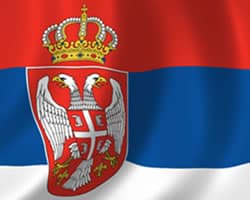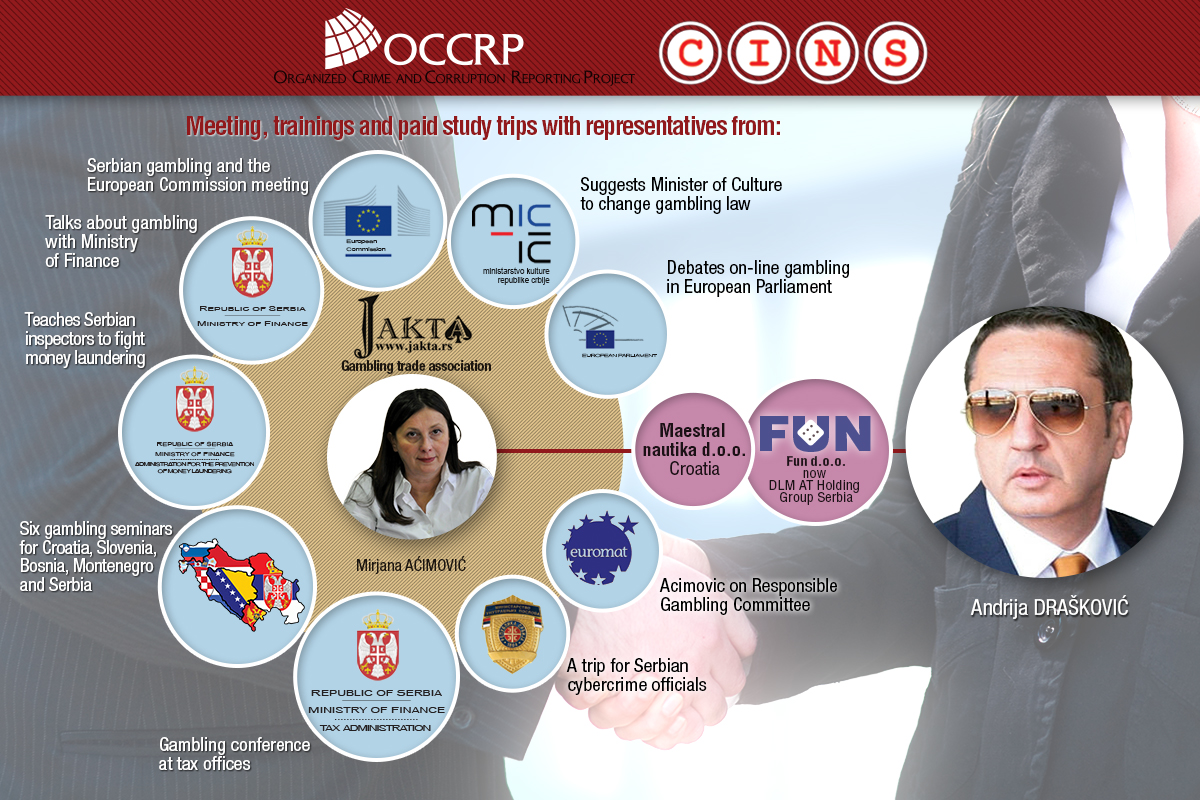Serbia Gambling Law
- Located in southeast Europe, Serbia attracts 3 million tourists every year who come to hike in its mountains or to ski in its winter resorts. Others visit the many historic Orthodox monasteries, Byzantine fortresses, or Soviet-era monuments.
- Gambling in Serbia is legal, licensed, and regulated. There are several brick and mortar casinos, sports betting shops, and a variety of other betting establishments such as bingo and slot halls. Online betting in Serbia is also legal, licensed, and regulated.
- Serbia Gambling Law Philippines
- Serbia Gambling Law Changes
- Serbia Gambling Laws
- Serbia Gambling Law 2020
This first edition of the “Exact Time in Gambling” conference will take place on the first day of Serbia’s Belgrade Future Gaming annual gaming fair, on June 5th, the most important and busiest day of the exhibition. For any additional details and registration, please use mihnea.popescu@topengineering.ro.
Story revised with new information, October 2009Thugs, drug dealers and even an accused war criminal dominated Serbia’s gambling industry a decade ago, their gun battles and bombings spilling across Europe. Many wound up dead, a few behind bars and most have been out of the business for a long time.
Today, there are signs of improvement. New laws are taking hold and several apparently legitimate businessmen and companies have assumed a greater piece of the gaming industry.
But an Organized Crime and Corruption Reporting Project (OCCRP) investigation leaves no doubt that among the new figures in the industry is a new stable of criminals. Court records and company registers indicate that money laundering and drug dealing are not obstacles to getting a gambling license.
The roster of casino and bet shop owners around the country is dotted with men with prison records and notorious affiliations.
Milan Narančić, for instance, was named in the 2002 Serbian state police White Book as a leader of the feared Surčin clan's heroin and cocaine trafficking operations. Today, Narančić controls company that makes slot machines, another that inspects them for accuracy and several slot machine parlors.
Another former member of the Sučin clan, Novak Buha, is on trial for extortion and other crimes, but still operates nine bet shops and gaming houses around the country.
And eight years ago, Slobodan Arambašić killed a director of the Zona Sreće - Zone of Luck - gambling parlor during a chaotic street battle involving guns and a grenade. Today, Arambašić, whose prison record includes drug and weapons convictions, is licensed as a half owner of the same parlor. Serbia is not rid of its rogue’s gallery of gambling hall operators.
Overall, 87 firms control 2,192 parlors, with nearly 20,000 machines in use, according to government records. Serbia collected €11.5 million in tax revenues from gaming facilities in the first three months of this year, up sharply from just fiveyears ago, when it collected €8 million for the entire year.
More money is on the horizon.
The Grand Casino in Belgrade is the only full casino operating in the country, but the Hit conglomerate of Slovenia has a license for another, and eight more licenses will be awarded, a ministry of finance spokesman said recently.
Hit, which operates Sarajevo's only full casino and has not been linked to any scandals, has not released any plans on when it might build.
Serbian officials said they hope an influx of new companies, combined with tighter rules on who gets licenses, will help fix many of the industry's problems. But that may take time.
Serbia Gambling Law Philippines
A lot of baggageAfter the dismantling of Yugoslavia, the end of the Slobodan Milošević regime and because of a cast of characters who wound up in morgues, jails, and The Hague, Serbia’s gambling industry still faces obstacles to coming clean.
In 2001, an overhaul proposed by the Ministry of Finance would have given the state a monopoly on casinos and betting parlors and tightened control over the cash they generated. The proposal noted that vast amounts of profits were not recorded – a problem that officials said persists today.
“The gray economy in the last decade has grown to extraordinary proportions, and the collection of public revenue, is practically symbolic,’’ said a statement accompanying a draft of the law when it was considered at the time.
Gambling industry owners howled in protest. Aleksandar Ganić, who owned the Jaguar chain of betting shops, organized an association of owners, lobbied the media and politicians and predicted the proposal would go nowhere.
Two years later, Ganić was arrested after police raided a warehouse he rented and found weapons, ammunition and 11.5 kilograms of plastic explosives. The Jaguar shops closed, and he disappeared from public view.
Then, in 2004, lawmakers passed a law to clean up the industry with little opposition, but it has fallen short of its goal.
The law essentially gave the state control over lotteries, while loosening regulation of other games of chance, such as casinos, sports betting and electronic games.
Tax revenues multiplied by more than 600 percent. But the law also put the state in control of licenses and that led to the closing of all the country’s casinos until they won state approval.
The first do to so was Grand Casino, which paid €18 million for a license and opened in Belgrade on June, 2007, with 25 tables and 230 slot machines.
The Grand Casino license was awarded in 2006 to a group of companies whose board of directors included Fredy Robinson, a Romanian-Israeli businessman. Robinson and companies he was involved with also own casinos in Romania, where he has paid more than €1 million to settle repeated violations of the country's money laundering and tax reporting laws, according to government records there.
Robinson was listed as one of two 'ultimate controlling shareholders,' according 2007 stock filing by Queenco Leisure International. Queenco owns a 38.5 percent stake in the company that now operates Grand Casino.
Last year, Robinson was arrested in Israel on fraud charges involving some of his other companies. He resigned from the board of Queenco on May 26 in a public dispute with the company and nowl owns 6.8 percent of Queenco's stock, according to company financial records filed with the London Stock Exchange.
Changes Under the New Law

The 2004 law that led to Grand Casino winning a license sharply changed Serbia's gambling industry. With casinos more tightly regulated, a flood of people jumped into the gambling and slot machine business. Some had unsavory ties to organized crime.
Narančić, born in Croatia in 1950, is one. The registered owner of LD Games Ltd., which manufactures electronic gambling machines and sells them throughout the Balkans, he is thought by authorities to control the BN Company of Belgrade, which operates 13 slot machine clubs.
Before entering the gambling business, Narančić was supposedly a leading member of the Surčin clan, the Serbian police said in a special investigative report in 2002. The group violently controlled heroin and cocaine trafficking operations in the region, the report said, and was active in money laundering and other crimes.
Narančić's most recent arrest was in 2003 as part of a police sweep aimed at alleged organized crime figures. But he was released four days later, has not had any legal troubles since and now operates businesses around the country.
The BN Company is registered in the name of his wife, Branka, although Narančić openly operates it and other slot-related companies. In 2007, one of the couple’s casinos was burned in an arson fire, and last year a bomb was thrown at their house.
Perhaps no Serbian gambling house has as colorful a story as the Zone of Luck. Established in 1995, the company now operates betting and slot machines in 23 locations around Serbia. The company has a bloody history; two past owners were murdered.
In 2001, the director of the gambling house, Dusan Trkulja had a heated argument with Arambašić. Guns and even a grenade were used, and by the time they were done, Trkulja was full of bullets and Arambašić was jailed on murder charges.
Trkulja had served 19 years in prison on seven convictions, including theft and armed robbery. Arambašić, with only five convictions and a shorter prison resume, was released after the prosecutor decided not to file charges.
In 2007, Darko Živković, another former owner, who police say ran a stolen car ring, and two friends were shot to death.
Eight years after his public shootout, Arambašić has 50 percent ownership in the gambling hall.
A Pedigree of Violence
Serbia Gambling Law Changes
 Serbia's current problems carry on a long tradition.
Serbia's current problems carry on a long tradition.According to friends, an up and coming criminal had started extorting him. That criminal was Željko Ražnatović, who was later indicted for war crimes, and known around the world as Arkan.
After Jablan fled, the casino business boomed, and those with the best connections to Arkan and the former communist power structure flourished.
Arkan’s associate and a commander in his paramilitary Arkan's Tigers was Slavko Mijović, also known as Mija Pijuk. He became part-owner of Fair Play Casino in the hotel Kasina at the center of Belgrade, and the founder and owner of the nightclub-gambling house Paladium.
On Oct. 19, 2001, Mijović was killed by an attacker with an automatic weapon who fired more than 20 shots into his Jeep in front of a Belgrade Café.
And Arkan, who began the casino mayhem when he chased Jablan out of the country, opened a casino at the Hotel Yugoslavia. On Jan. 15, 2000, Arkan was shot to death inside the lobby of the Hotel Intercontinental, in front of his wife, the famed singer Ceca, and their two children.

As for Jablan, he didn’t run far enough. In the summer of 1998, he was murdered in the garage of elite hotel Hilton in Prague, Czech Republic.
Stevan Dojčinović
CORRECTION: A story on casino gambling in Serbia that was produced by members of the Organized Crime and Corruption Reporting Project incorrectly stated that Romanian-Israeli businessman Fredy Robinson controls the Grand Casino in Belgrade.
The Grand Casino, the only operation licensed in Serbia to operate as a full casino, is majority owned by Club Hotel Loutraki S.A. in Greece. Club Hotel Loutraki is, in turn, owned by a series of companies that lead back to Queenco Leisure International Ltd., which was founded in Israel in 2002.
Queenco on its website identifies Loutraki and Casino Belgrade as two of the casinos owned and managed by the company and its subsidiaries. In 2007, Robinson was identified as one of two “ultimate controlling shareholders” of Queenco, in a company stock offering, and he was on the board of directors when he resigned May 26, 2009. His direct stock interest in the company, now, though, is 6.8 percent, according to Grand Casino’s managing director, Christos Tsemperas and to filings with the London Stock Exchange.
Serbia offers many choices for sports bettors, although the legality may be questionable at times. It is one of the six independent counties formed after the breakup of Yugoslavia. Serbia is landlocked country, positioned where Central Europe crosses into Southeastern Europe. Prior to 2008 Kosovo also formed part of Serbia, although now it is now recognized as an independent country by the majority of UN member states.
In this guide to online sports betting you can first find a quick overview of how the industry has developed in Serbia. Then the online betting is looked at along with the taxation laws applied to the public. Following this you can see how the different sites accommodate Serbian players before finishing off with thoughts on how sports betting in Serbia might change in the future.
Early Regulation and Changes in Serbia
After the Yugoslav states separated in the 1990s, Serbia continued to keep the 1964 laws applied to all forms of gambling. This meant operators had to first gain a license from the government which quickly led to gambling becoming a state run operation. Despite a casino opening in Belgrade in the late 1960s, the majority of operators were only allowed to offer a football forecasting game from dedicated kiosks and shops, which were also focused on the capital.
In the aftermath of the 1990s wars a lot of Serbia was left devastated both politically and structurally. In this environment sports betting and other forms of gambling attracted a strong criminal element and illegal bookmakers were easy to find. It was not until 2004, as the state moved to a more democratic government, that they were able to address this.
The Games Of Chance Act came into effect in 2005 [1] and allowed all forms of gambling to become regulated and opened up the door for private companies. Prior to this there were 300 legal betting shops in Serbia, a number which rose to 1,728 after the 2004 legislation and gaming taxes and fees provided €155m in revenue to the Serbian government in the three years to 2008 [2].
Despite the increase of legal sports betting operations the concentration still falls in and around Belgrade, and the unregulated operations are still rife throughout the rest of the country. The largest legal operator is the Meridan Group which operates many of the Belgrade shops and has launched their own online bookie after becoming licensed by Malta in 2008.
Legislation Introduced and Access to Gambling Sites Blocked
While the rise in online betting sites grew throughout the 2000s, it was not until 2011 that Serbia addressed the online betting industry with legislation[3]. Until that point any company could provide betting in Serbia without breaking any laws and without paying any taxes to the government. The legislation laid out the rules for operating an online business within its jurisdiction including taxes and charges along with the stipulation any company providing online games had to have servers with Serbia’s borders.
This was followed up a few months later when ISPs were instructed to block access to 70 gambling sites [4]. These included large industry names like Bwin.Party, 888, Betfair, Skybet and William Hill. This caused initial worries in the industry although it soon became apparent that the ISPs did not enforce the block, despite initial threats of prosecution, as they felt the order had no legal grounds. Some companies did pull out of their own accord due to legitimacy concerns elsewhere in the world, the fact the Serb market was not big enough to risk operating there or due to software deals they have with PlayTech, who also supply software to the Serbia’s State Lottery and their betting sites.
Overall the effects were far milder than expected as there has been no follow up to enforce these rules by the government. Furthermore there are no laws in place to prevent citizens using international betting sites so you can still access the majority of sites with no interference. Ensure the betting sites you choose are respectable and licensed if you choose to do this.
Serbian Gambling Taxes
There has been no indication from the state that they intend to tax profits individuals make from gambling. Even if this was to change, with many companies operating a grey market, with no clear enforcement by Serbia, it seems unlikely the systems would be in place to correctly tax the public.
Serbia Gambling Laws
You Can Access Foreign Online Sportsbooks But Euros Are the Best Option
Serbia Gambling Law 2020
Apart from the few state licensed operators there are some operators providing sports betting in the Serb language as well as customer support, although not a large number. The vast majority of sites however offer the major European languages and Russian. It is a similar story with trying to use the Dinar and in most cases when you deposit your funds will have to be exchanged and stored in Euros. This is a slight inconvenience as fees are normally deducted for currency conversions and you have to wager in Euros.
Deposits can be made using Serbian credit and debit cards, including those with Visa and MasterCard branding. E-Wallets such as Neteller and Skrill also provide a quick online method and by having your wallet in Euros, it can cut out some of the currency exchanges when moving funds between sites.

Possible Regulations to Come in Serbia
There were suggestions that Serbia may look to further regulate the online market in 2014 – although there has been no sign of this yet. As it is things seem set to continue as they are for now with a handful of state regulated sites among many international choices. This also makes sense when you consider that Serbia is attempting to join the EU soon, where it may be forced to allow EU licensed sites to operate regardless of anything implemented now.
References
[1]Serbia– A Regulatory Report – Chapter 2 – Gambling Compliance
[2]Serbia– A Regulatory Report – Chapter 3 – Gambling Compliance
[3]Serbia Creates Brand New and Well-Regulated Laws Concerning Online Gambling – JAKTA
[4]Serbia Orders Blocking of 70 Sites – Calvin Ayre